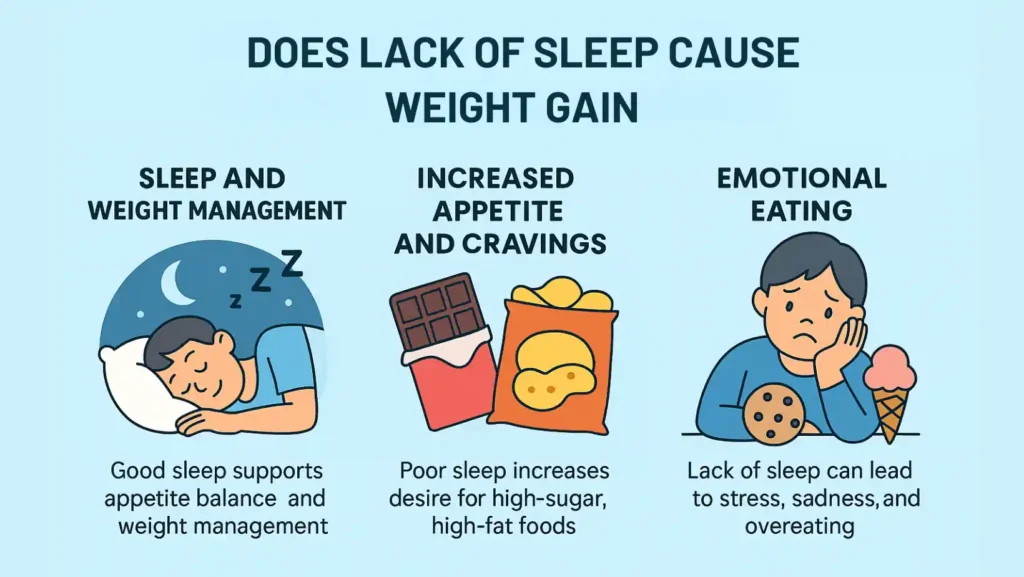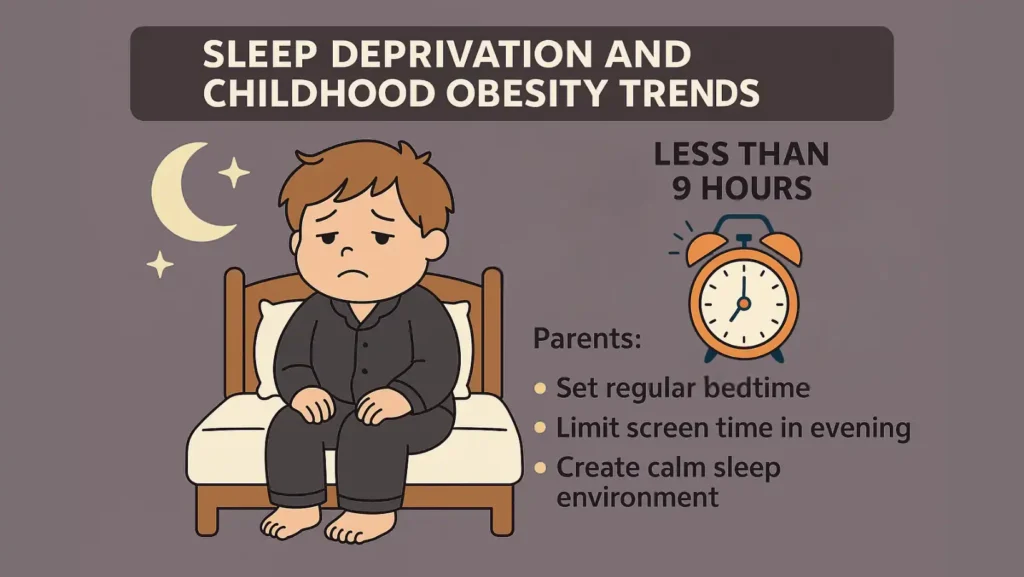Sleep and obesity connection is one of the most overlooked health topics today. While people focus on diet and exercise, sleep remains a missing piece of the puzzle. Scientists now agree that how much and how well we sleep strongly influences body weight. Poor rest changes hormones, slows metabolism, increases cravings, and reduces motivation to move. This article will explain in detail how sleep affects obesity, why children are more vulnerable, and what you can do to improve sleep for better health and weight control.
How Sleep Affects Obesity And Weight Gain?
The link between sleep and obesity is not just about feeling tired. Your body works on internal clocks called the circadian cycle. When sleep is disrupted, metabolism and hormones shift in harmful ways. Food intake rises, calorie burning falls, and fat storage increases.
Sleep Deprivation And Obesity: The Science
Studies show that sleep deprivation and obesity go hand in hand. Adults who sleep less than six hours per night are more likely to have higher body mass indexes. Teenagers who cut their sleep short often snack late at night and gain weight faster.
Short sleep alters the circadian rhythm and weight gain link. Your body expects meals during daylight hours. Eating late at night confuses metabolism, making calories more likely to be stored as fat.
Even lab tests confirm this. When volunteers are allowed only four hours of sleep for several nights, their blood sugar levels spike, insulin resistance rises, and fat storage accelerates. These are the same patterns seen in people at risk of diabetes and long-term obesity.
How Lack Of Sleep Impacts Hormones And Fat Storage
Lack of sleep and weight gain are connected through powerful chemicals in your body. Leptin is the hormone that signals fullness. When you sleep well, leptin rises, keeping appetite steady. But when you cut sleep short, leptin drops.
On the other side is ghrelin, the hunger hormone. Poor sleep makes ghrelin climb. The mix of low leptin and high ghrelin is a recipe for overeating. People crave sugar and junk food, often leading to late-night snacking.
Another factor is cortisol and weight gain. Poor sleep raises cortisol, a stress hormone that pushes fat to the belly area. This explains why people often complain of belly fat after weeks of poor rest.
Low sleep quality also harms metabolism and sleep balance. Tired muscles burn fewer calories. Resting metabolic rate declines. This means you gain weight even if food intake stays the same.
Bad Sleep, Low Energy, And Reduced Calorie Burn
When sleep is poor, energy crashes. People skip workouts or avoid walks. Even daily chores feel heavy. This means fewer calories burned.
Tiredness also makes people choose shortcuts. Instead of cooking balanced meals, they order fast food. They skip the walk after dinner. They drink less water and more soda or coffee. These choices compound bad sleep weight gain over months.
Does Lack Of Sleep Cause Weight Gain

The question often asked is: does lack of sleep cause weight gain? The evidence is strong. Short sleep disrupts appetite control, reduces activity, and increases fat storage.
The Link Between Sleep And Weight Management
Good sleep helps balance appetite and supports sleep and weight management. People who sleep seven to nine hours make healthier food choices, feel more energetic, and lose weight more effectively when dieting.
How Poor Sleep Increases Appetite And Cravings
Poor sleep increases desire for foods rich in sugar and fat. The brain’s reward center becomes more active when tired, making junk food look more appealing. A chocolate bar or bag of chips feels harder to resist.
This craving effect explains why tired people often eat a fourth meal before bed. Unfortunately, those late calories turn straight into stored fat.
Sleep Loss And Emotional Eating
Lack of sleep also worsens mood. Stress, sadness, or irritability rise. Many people cope through food, leading to emotional eating. Cookies, ice cream, or fried food become quick comfort. Over time, this cycle creates steady weight gain.
Kids, Sleep, And Obesity Risk
Children are more sensitive to poor sleep. Their bodies are still growing, and their metabolism is quick to react.
Why Children Need More Sleep To Prevent Weight Gain
Children need more sleep hours than adults. Infants need 12 to 16 hours, school-aged children need 9 to 12 hours. When sleep is cut short, they become cranky, crave sweets, and eat more.
Parents often notice that children who stay up late eat chips or sweets while watching TVs. The extra calories, combined with low energy the next day, fuel higher obesity risk.
Sleep Deprivation And Childhood Obesity Trends
Studies confirm that sleep deprivation and obesity risk is rising in kids. Obesity in children often links with irregular bedtimes, too much screen time, and disrupted routines.
One large study found that kids who slept less than 9 hours per night were almost twice as likely to be overweight. Early habits matter. Parents can protect their children by setting a steady bedtime routine, reducing phones or computers use in the evening, and creating a calm sleep environment.
Tips For Better Sleep And Weight Loss
Improving sleep can directly improve weight control. Here are practical steps.
Create A Consistent Bedtime Routine
Set the same bedtime and wake-up time daily. This locks your circadian cycle in place. Over weeks, the body adjusts, making it easier to fall asleep and wake naturally.
For children, routines like brushing teeth, reading, or listening to calm music help. Adults benefit too.
Limit Screens And Caffeine Before Bed
Blue light from phones, computers, and TVs reduces melatonin, the sleep hormone. Turn off screens at least one hour before sleep.
Caffeine also lingers in the blood for hours. Avoid coffee, tea, or energy drinks after mid-afternoon.
How Much Sleep Is Ideal For Weight Management
Research shows adults should aim for seven to nine hours. Studies on sleep duration and obesity confirm that people who get less than six hours are at much higher risk of weight gain.
Children and teens need more. Infants may need up to 16 hours. Missing these needs consistently increases obesity risk.
Improve Sleep Environment
Your bedroom environment plays a role. A supportive mattress and pillow reduce tossing and turning. Use cooling materials in sheets and blankets if you get hot at night.
A fan or adjusted thermostat helps maintain comfort. Reducing noise and light keeps sleep deeper. This lowers the risk of night wakings and snoring.
Small Daily Habits That Add Up
Drink enough water during the day. Short naps should not exceed 30 minutes. Light exercise, such as a walk after dinner, helps regulate blood sugar and supports better sleep.
Avoid junk food close to bedtime. Heavy meals late at night disturb rest. Instead, try a small fruit snack or herbal tea if hungry.
Aim For Healthy Sleep Habits
This practice is called sleep hygiene and weight control. It includes keeping the room dark, avoiding late caffeine, reducing alcohol, and having a steady schedule. These habits support healthy sleep for weight loss.
Special Notes On Sleep Disorders
Some people still feel tired despite sleeping long hours. They may suffer from sleep apnea and obesity. This condition causes breathing to stop many times during the night, reducing oxygen levels.
Larger people are at higher risk of sleep apnea. Symptoms include loud snoring, gasping at night, or morning headaches. Treatment with medical devices or weight reduction improves health and restores energy.
If poor sleep continues despite good habits, see a doctor. Professional checks can rule out disorders.
The Takeaway: Sleep And Weight Management Go Hand In Hand
The sleep and obesity connection is real. Poor rest leads to cravings, higher appetite, and belly fat. It also reduces energy for activity. Over time, this cycle locks people into steady weight gain.
On the other hand, good sleep balances hormones, improves energy, and makes weight control easier. Treating sleep as seriously as diet or exercise is the smart way forward.
Even small steps like a steady bedtime, limiting screens, and choosing a better mattress can have powerful effects. Sleep is not just rest. It is a daily reset button for health.
FAQs
How is sleep linked to obesity?
Sleep influences appetite, hormones, and metabolism. Poor rest raises hunger and reduces calorie burning, creating a strong link between sleep and obesity in both adults and kids.
Does lack of sleep cause belly fat?
Yes, short sleep raises cortisol, lowers leptin, and increases cravings. These shifts push fat storage toward the belly, making lack of sleep and weight gain strongly visible there.
Do obese people sleep more or less?
Some sleep less due to apnea and snoring. Others may oversleep but still feel tired. Sleep quality matters more than hours alone in relation to body size.
Does sleeping late cause weight gain?
Late nights shift the circadian rhythm and weight gain pattern. People snack more at night, skip morning exercise, and disrupt metabolism, raising the risk of long-term fat storage.
Is sleeping 7–8 hours per night linked to obesity?
Seven to eight hours lowers obesity risk. Both shorter and longer durations raise health risks. Balanced sleep duration helps sleep and weight management most effectively.
How many hours of sleep do adults need?
Most adults need seven to nine hours. Less than six increases fat storage. More than ten may reflect illness. Consistency is the key.
Does oversleeping make you gain weight?
Yes, oversleeping reduces activity levels and may reflect hormonal imbalance from poor sleep. Low energy encourages overeating, which leads to steady weight gain over time.


















Leave a Comment